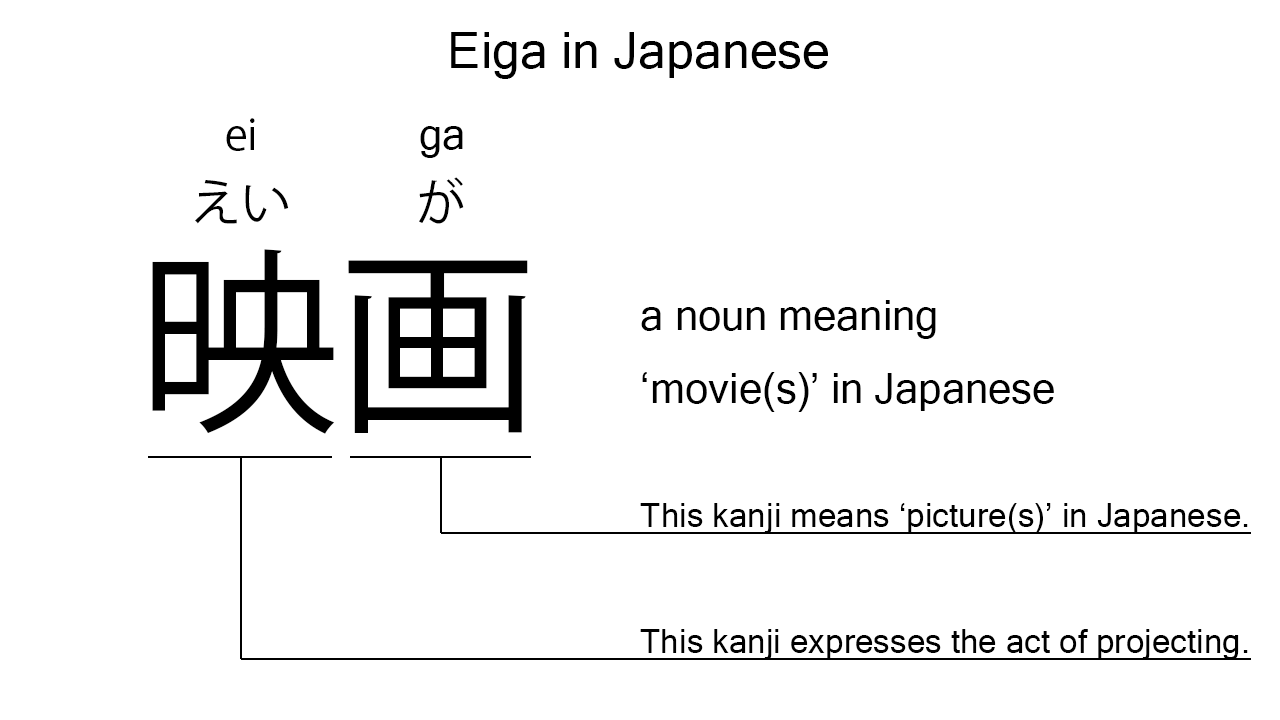What does “eiga” mean in Japanese?
Native speakers use eiga to mean a ‘movie’ in Japanese. Perhaps, some Japanese learners know this word as it is sometimes used in Japanese conversations. In this blog post, however, I’m explaining this word in detail based on its kanji expression. And also, I’m explaining how to use it through example sentences. My explanations would help Japanese learners understand eiga more clearly. Then, let’s get started!
Contents
Definition and meanings of “eiga”
Let me start with the definition and meanings of eiga.
- eiga – 映画 (えいが) : a noun meaning a ‘movie’ in Japanese. This can also work as plural. Learn more about Japanese plural. Depending on the context and situation, this can also mean a ‘film’ or ‘motion picture’ in Japanese.
Japanese native speakers use this noun normally to refer to consecutive images projected on screens.
The definition and meanings are simple and clear. To understand this noun more clearly, however, let me explain its kanji characters in detail, one by one.
Eiga in kanji
The kanji expression of eiga consists of the following two kanji characters:
- 映 : a kanji character widely used to refer to the act of projecting or casting.
- 画 : a kanji character widely used to mean a ‘picture’ or ‘image’ in Japanese.
From these two kanji characters, we can understand that the formed noun literally means a ‘projected picture’ in Japanese. This literal interpretation is not completely in line with the actual meanings, but still understandable, I think. Movies are often consecutive pictures projected on screens.

When we meet new kanji expressions, we should check their kanji characters in detail to understand their meanings clearly and deeply. In many cases, kanji characters tell us a lot about the meanings of the expressions they form. Actually, here, we could get the better understanding of eiga through the detailed kanji check above.
So far, I’ve explained the definition and meanings of eiga together with its kanji characters. Then, let me explain how to use it through the example sentences below.
How to say “movies” in Japanese
boku wa eiga ga totemo suki desu – 僕は映画がとても好きです (ぼくはえいががとてもすきです)
I love movies so much.
Below are the new words used in the example sentence.
- boku – 僕 (ぼく) : a pronoun meaning ‘I’ in Japanese. This is used mainly by boys and young males.
- wa – は : a binding particle working as a case marker or topic marker. In the example, this works after boku to make the subject in the sentence.
- ga – が : a case particle used to make the subject word or the object word in a sentence. In the example, this is used after eiga to make the object in the sentence.
- totemo – とても : an adverb of degree meaning ‘very’, ‘much’, ‘so’, or such in Japanese. In the example, this works in front of suki to emphasize its meaning.
- suki – 好き (すき) : the stem part of the na-adjective, sukina, which means ‘favorite’ in Japanese. Native speakers, however, often use this as an individual word to mean ‘to like’ or ‘to love’ in Japanese. In the example, this is used to mean ‘to love’ in Japanese.
- desu – です : an auxiliary verb used after a noun or adjective to make it polite. Probably, this is well known as a part of Japanese desu form. In the example, this is used after suki to make it sound polite.
This is a typical usage of eiga. In this example, it works together with the case particle, ga, to become the object in the sentence.
Another example of “eiga”
kanojo wa mainichi eiga wo miru – 彼女は毎日映画を見る (かのじょはまいにちえいがをみる)
She watches a movie every day.
Below are the new words used in the example sentence.
- kanojo – 彼女 (かのじょ) : a pronoun meaning ‘she’ in Japanese.
- mainichi – 毎日 (まいにち) : a noun meaning ‘every day’ in Japanese. This can also work as an adverb almost anywhere in a sentence. In the example, this works as an adverb in the middle of the sentence to mean ‘every day’ in Japanese.
- wo – を : a case particle used to make the object word in a sentence. In the example, this is used after eiga to make the object in the sentence.
- miru – 見る (みる) : a verb meaning ‘to see’, ‘to look’, ‘to watch’, or such in Japanese.
This is another example of eiga. In this example, it works as a part of the commonly-used phrase, eiga wo miru, which means ‘to watch a movie’ in Japanese. When we want to refer to a movie or movies in Japanese, anyway, eiga is always a very good option.
Summary
In this blog post, I’ve explained the definition and meanings of eiga in detail based on its kanji expression. And also, I’ve explained how to use it through the example sentences. Let me summarize them as follows.
- eiga – 映画 (えいが) : a noun meaning a ‘movie’ in Japanese. This can also work as plural. Depending on the context and situation, this can also mean a ‘film’ or ‘motion picture’ in Japanese. Japanese native speakers use this noun normally to refer to consecutive images projected on screens. These two kanji characters literally mean a ‘projected picture’ in Japanese. This literal interpretation is not completely in line with the actual meanings, but still understandable, I think. Movies are often consecutive pictures projected on screens.
Hope my explanations are understandable and helpful for Japanese learners.
Leave a Reply